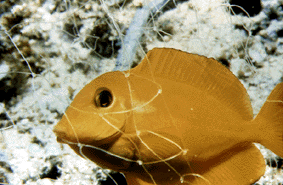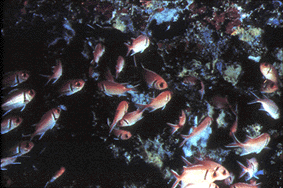
NEXT INDEX HOME
 NEXT INDEX HOME |
| Tips for Snorkelers |
|---|
Laurie Lubeck |
|
Advise from the Tourism Council of the South Pacific | |||
|
|
| ||
|
How about certified scuba divers? They are supposed to be well-trained,
but many diving tours promise certification as quickly as possible. Do these
divers know how to minimize damage to the coral reef and marine life?
Emiko, a tourism student at Rikkyo University, is a scuba diver. She is
very concerned about the impact of tourism development on the islands of
Okinawa and says, "When I visited the Yaeyama Islands, I could hardly
find any living coral." She blames this situation on the souvenir trade,
anchors of diving boats, and abnormal quantities of starfish. Also, she
attributes this damage to
the "excessive development of ports, bridges, beachfront hotels, and
towns that reclaimed the coral area as well as the washout of mud from rivers
to the sea."
Future resort development is sure to kill more coral, she fears. "We
can't find a strong movement to disagree because Okinawan economics are
generally maintained by the tourism industry. Tourists should come to know
the real Okinawa as it is, not with an artificial beach, but to recognize
its natural splendor, the richest beauty in all of Japan." She questioned,
"Why would people want to develop golf courses with toxic chemical
runoff near such a treasure house?" Emiko has observed the impact of scuba diving. "We divers are partly responsible for the decrease of coral," she says. "The anchors we cast at diving spots break the coral. Most diving shops have ignored this fact up until today, but a few have recognized this problem and stopped."

(Photo: The World Wildlife Fund)
It is strange to Emiko that divers and the industry associated with it do
not appear to be concerned about protecting coral. "I think we can
and have to be at the forefront of its conservation," she pleaded.
"Divers know best how rich and essential the coral sea is. Unlike coral
dealers, we do not get economic benefit but rather a mental benefit from
the sea. Yet I have never seen an article about conservation of coral in
any diving magazine."
Perhaps there have been many wonderful articles that she didn't see, but
it is certain that there should be more.
Jean-Michel Cousteau is a world famous diver, fighting for the protection
of the sea. He says that recreational divers are taught how to dive, but
not necessarily taught how to dive with minimal impact on undersea life. 
(Photo: The World Wildlife Fund)
"On the average," he says, "a diver hits something 11 times
every half hour. Corals are stepped on, broken off, killed." The cause,
he says, is "poor fin technique which creates damaging water currents
or kicks up sand that chokes the reef." When the reef can't breathe,
it dies and the colorful fish disappear.
Cousteau warns that having too many dangling accessories, although fashionable,
can be a dangerous distraction. It can get tangled on plants or knock against
coral. Careless contact with certain coral and creatures can be poisonous.
He is encouraged, however, that there is a growing number of "eco-divers"
who have learned better techniques. He says that "eco-diving begins
with the diver's attitude and expectations." It is important to know
all about the dive site and to research the local marine life. Having the
proper equipment is just as important in order to avoid fatigue, panic and
sloppy techniques that can | |||